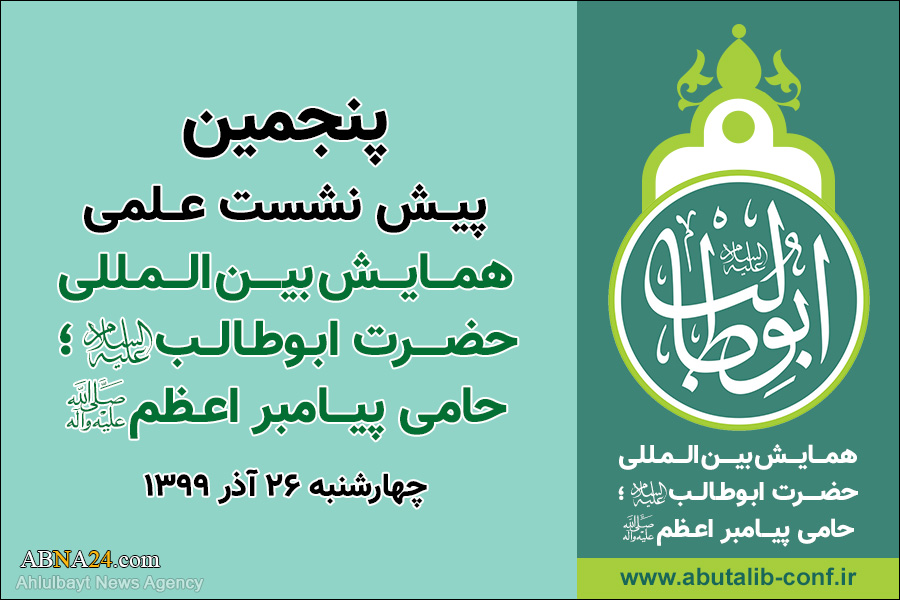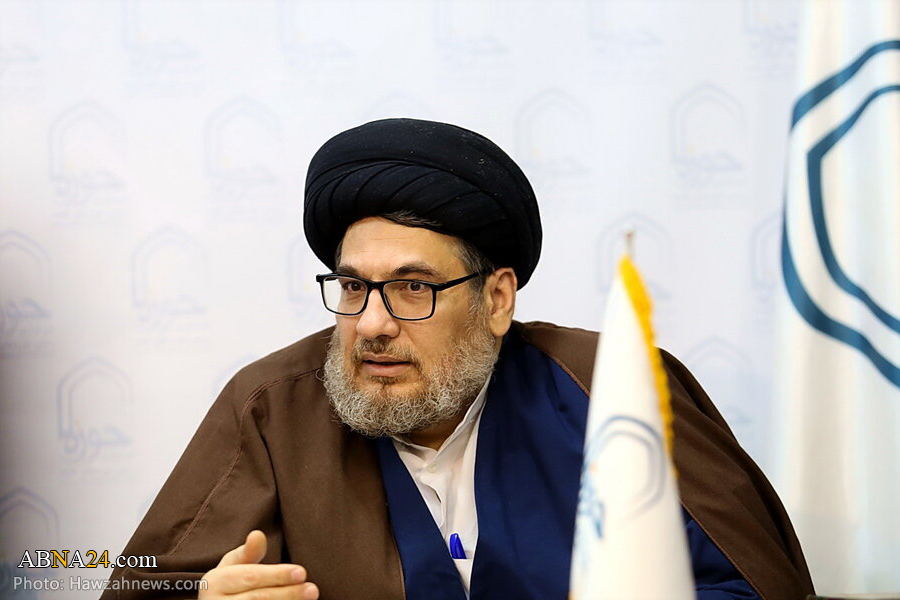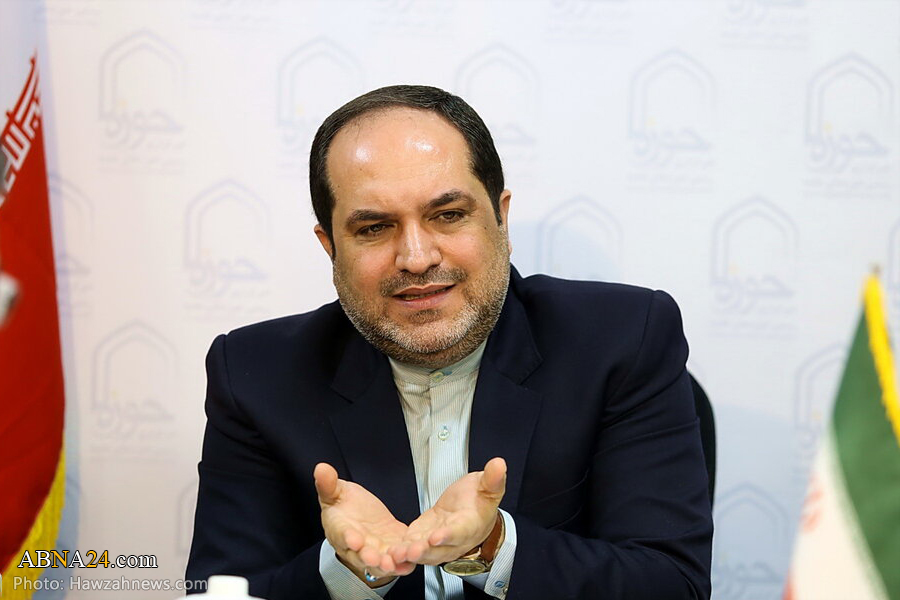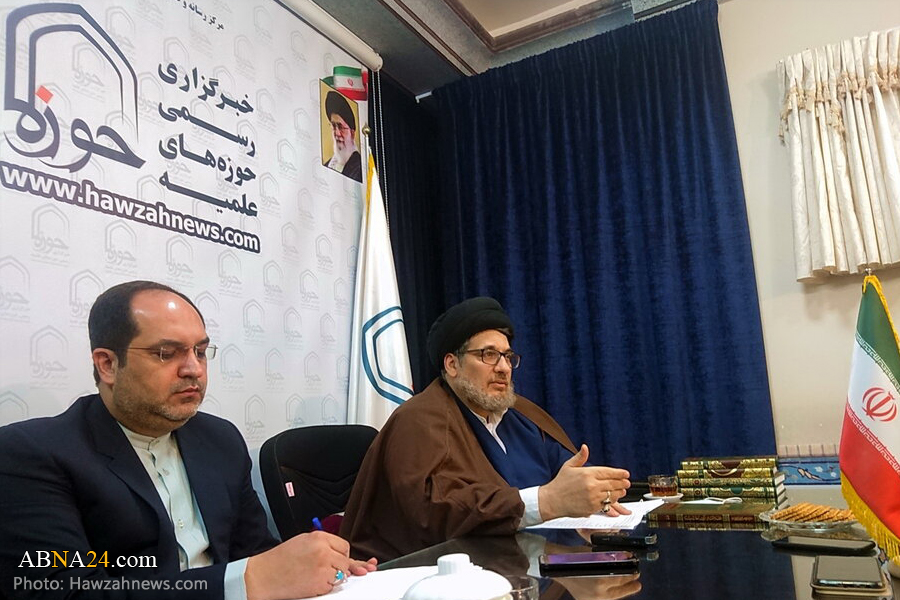- صفحه اصلی
- درباره همایش
- کمیته های علمی
- برگزارکنندگان و حامیان
- فراخوان ها
- فراخوان علمی همایش
- فراخوان کنگره شعر
- اخبار و گزارش ها
- اخبار همایش
- پیش نشست های علمی
- همایش سه روزه
- برای پژوهشگران
- درباره حضرت ابوطالب
- تراث ابوطالب
- شیوه نامه تألیف مقالات
- شعر و ادب
- نوحه
- چند رسانه ای
- دانلود پوستر و بروشور
- گالری تصاویر
- دانلود ویژه نامه ها
- ارتباط با همایش
- نشانی دبیر خانه
- ارسال مقالات
5th Academic Pre-Conference of International Conference “Hazrat Abu Talib (a.s.), the Supporter of Great Prophet (p.b.u.h)
In the narrative heritage of the Shiites, there have been many researches and questions about Abu Talib (a.s.) throughout history.
Simultaneously with the “Research Day”, in order to hold the International Conference of “Hazrat Abu Talib (a.s.); the Supporter of the Great Prophet (p.b.u.h)”, the “5th Academic Pre-Conference” of the conference was held in Qom.
The meeting was held on Wednesday, December 16, 2020 by the Secretariat of the International Conference of Hazrat Abu Talib (a.s.) and hosted by the Hawza News Agency, and in addition to the presence of a number of seminary students, it was also available through a webinar.
In this webinar, Sayed Mohammad Morteza Al-Ameli, director of the Institute of Biography Research and Islamic Thought Studies, (the son of the great historian of the Shiite world, the late Allama Seyyed Jafar Morteza Al-Ameli), and Dr. Alireza Hazar, university professor and lecturer of the Jafari Culture Foundation, discussed and commented on issues related to Hazrat Abu Talib (a.s.).

Abu Talib (a.s.) oppressed by the history
Referring to the great personality of Hazrat Abu Talib and the Shiite negligence in dealing with this exemplary figure in history, Hojat al-Islam al-Ameli said, “Hazrat Abu Talib, the Prophet’s uncle, had a very high personality which has been oppressed and neglected by history.”
“The character of Abu Talib (a.s.) is known from his faith in the critical moments of the beginning of Islam - such as the time of Abi Talib’s She’eb (Meccan boycott of the Hashemites)”, he added.
“His character should be understood from the bottom of his heart, but the information about him is incomplete and there is a need for more research on this great man, both in the pre-Islamic and post-Islamic periods”, noted the director of the Institute of Biography Research and Islamic Thought Studies.
He considered the periods of “before Year of the Elephant”, “the birth of Abu Talib” and his “childhood, adolescence and youth” as examinable and said, “For example, it should be examined what wars Abu Talib participated in during his youth and what was the reason for this presence?”

Referring to the various supports of Abu Talib (a.s.) for the Prophet (p.b.u.h) Al-Ameli said, “It should be written that Hazrat Abu Talib (a.s.) not only helped the Prophet (p.b.u.h) with words, but also took up the sword in defense of the Prophe (p.b.u.h) and in support of Islam and was willing to sacrifice his life.”
Director of the Institute of Biography Research and Islamic Thought Studies also referred to the “jurisprudential aspects” of Abu Talib's biography and said, “The answer to many jurisprudential questions - in the field of Khums, Inheritance, etc. - can be obtained by using the life story of Abu Talib (a.s.).”
Al-Ameli also referred to the literary and artistic dimension of Abu Talib (a.s) and said, “Imam Ali (a.s.) says, “Learn the poems of Abu Talib and teach them to your children that there is a lot of knowledge in them.””
He also suggested the following topics for research on Abu Talib:
- Names and titles of Abu Talib (a.s.)
- Who called Abu Talib Abd Manaf?
- Abu Talib (a.s.) in the Holy Quran,
- Abu Talib (a.s.) and Holy Quran,
- The Prophet was named Ahmad by Abu Talib (a.s.),
- Praying for the Rain by Abu Talib (a.s.),
- Abu Talib’s military presence to defend Prophet Muhammad (p.b.u.h),
- Why did all the sons of Abu Talib (a.s.) believe in Islam? The role and method of Aboutaleb in raising his children,
- Shafa'a (intercession) by Hazrat Abu Talib (a.s.),
- The pre-Islamic rules for Hajj some of which were founded by Abu Talib,
- Concealment of faith by Abu Talib (a.s.) and its reasons,
- Clothes and physical features of Hazrat Abu Talib (a.s.),
- Abu Talib (a.s.) in Abyssinia,
- Moral characteristics of Abu Talib (a.s.),
- Hazrat Abu Talib (a.s.) patience on hardships,
- History of the Prophet (p.b.u.h) during the life of Abu Talib (a.s.),
- History of the Prophet (p.b.u.h) after the demise of Abu Talib (a.s.),
- Hazrat Abu Talib’s role about Zamzam well and its protection, as well as Kaaba,
- Hazrat Abu Talib accompanied Abd al-Muttalib on his trip to Yemen and the events that took place during the trip,
- Hazrat Abu Talib’s role in sacrificing his brother Abdullah, and how he would have behaved if he had been a sacrifice, and would he have submitted to the command of his father and God?
- The role of Abu Talib and his wife, Fatemeh bint Asad, during the birth of the Prophet Muhammad (p.b.u.h) and meeting the angels and annunciating and sacrificing the Aqeeqa on the seventh day,
- Hazrat Abu Talib’s role in the story of Abraha’s attack on the Kaaba and accompanying his father
- Hazrat Abu Talib’s role after the “Year of the Elephant” in relation to the issue of breastfeeding the Prophet (p.b.u.h),
- Hazrat Abu Talib’s reaction to the death of Hazrat Abd al-Muttalib,
- Was Abu Talib his father’s successor or someone else?
- Why did Abd al-Muttalib choose Abu Talib to take custody of the Prophet (p.b.u.h)?
- Abu Talib’s role in upbringing of the Prophet (p.b.u.h),
- Did Abu Talib take part in any wars?
- What was the role and position of Abu Talib in “Fajjar War”?
- Hazrat Abu Talib’s role in the “Helf al-Fozul”, and many other cases such as the construction of the Kaaba,
- Hazrat Abu Talib’s travels to Levant and other places,
- Hazrat Abu Talib’s role in the marriage of Hazrat Khadijeh (a.s.) with the Prophet Muhammad (p.b.u.h),
- Did Hazrat Abu Talib (a.s.) have a business partnership with Hazrat Khadijeh?
- Property and assets of Hazrat Abu Talib (a.s.).
“Enmity with Abu Talib (a.s.)” is a Jewish project
In this academic session, explaining the course of “Research on Abu Talib (a.s.)” throughout history, Dr. Alireza Hazar said, “Research on Abu Talib (a.s.) has always been considered as a red line throughout the history of Islam.”
Quoting the “Nubakhti” as saying “The Twelver sect are believers in the faith of Hazrat Abu Talib (a.s.), Dr. Hazar added, “In the narrative heritage of the Shiites, there have been many researches and questions about Abu Talib (a.s.) throughout history.”
“From the beginning of Sheikh Mofid’s time, the writing on Hazrat Abu Talib (a.s.) began and Sheikh Mofid himself has written a treatise about this character which is known as the treatise “Abu Talib’s belief””, Hazar said.
“For many years, the book “Al-Hojjato ala al-Dhahab ela Takfir Abi Talib” by “Sayed Shams al-Din Fakhar bin Mo’ad al-Mousavi", which contains many narrations on Hazrat Abu Talib (a.s.), was considered as a source of research on Abu Talib”, he stated.
“Then, the sign that this issue has been considered during the Safavid period is the many narrations that have been mentioned in the book “Bihar Al-Anwar””, the university Prof. continued.
“In modern period, Allama Amini in the 7th and 8th volumes of his book “Al-Ghadir” has dealt well with Hazrat Abu Talib (a.s.). After Allameh Amini, the late Allameh “Jafar Morteza Al-Ameli” wrote strongly on Hazrat Abu Talib (a.s.)”, he clarified.

Regarding the approaches of research on Abu Talib (a.s.), Hazar said, “Talking Abu Talib (a.s.) can be either “Extra-religious” or “Intra-religious” perspectives. All the works that have been written about Hazrat Abu Talib (a.s.) so far have been with an Extra-religious view and we do not have strong Intra-religious studies and researches about him.”
Alireza Hazar also stressed the need to address other aspects of Abu Talib’s (a.s.) personality and said, “A misunderstanding was made for Shiite scholars and they thought that the level of discussion about Abu Talib was just enough to say that he was not an infidel and was a believer. While to prove his faith, Sheikh Mofid's treatise was sufficient.”
The university professor also referred to the Sunni views on the faith of Abu Talib (a.s.), and said, “Ibn Abi al-Hadid” in the sixteenth volume of his book, “Sharh Nahj al-Balaghah”, in a chapter entitled “Dispute about the faith of Abu Talib” has said that many sunnis also acknowledge his faith.”
He called the failure to study the various aspects of Abu Talib’s life a “project” and stated, “In my opinion, the ‘enmity with Abu Talib (a.s.)’ was a project led by Judaism, and this theory is based on solid reasons.”
A member of the Jafari Culture Foundation also spoke about the literary and poetic aspect of Abu Talib (a.s.) and noted, “Reading the poems of Abu Talib (a.s.), in addition to help being familiar with him, can also acquaint us with his character.”
In the end, Dr. Hezar suggested 7 general topics for the clerics to conduct research about Abu Talib (a.s.):
- Introducing the symbol and symbolic role of Abu Talib (a.s.) in Shiite thought and its functions throughout history;
- Abu Talib (a.s.) in the poems of Persian speaking poets;
- Specifying the different parts of the poems of Abu Talib (a.s.);
- Introducing Sunni scholars in the chapter “Dispute on the faith of Abu Talib” in the book “Sharh Nahj al-Balaghah” by Ibn Abi al-Hadid.
- Abu Talib (a.s.) in the texts for pilgrimage of Imamas (a.s.)
- The jurisprudence of hadith about the narrations about Hazrat Abu Talib (a.s.);
- The intercession of Hazrat Abu Talib (a.s.).

It should be mentioned that by the initiation of the AhlulBayt (a.s.) World Assembly, and support and cooperation of the similar institutions, including, “Imam Hossein (a.s.) Holy Shrine”, Hazrat Aboutaleb Research and Publishing Institute”, “The World Forum for Proximity of Islamic Schools of Thought”, “Islamic Sciences and Culture Academy of Islamic Propagation Office”, “Al-Mustafa International University”, “Hawza Language teaching center”, “International University of AhlulBayt (a.s.)”, “Mirath-e Nabowat Cultural Institute”, “Jamiat al-Zahra Seminary University”, “Zorria al-Nabawia Research Center”, “Qasem ibn al-Hassan (a.s.) Religious-Cultural Institute”, and “Abna al-Rasoul Cultural and Artistic Institute”; international conference “Hazrat Abu Talib (a.s.), Supporter of the Great Prophet (p.b.u.h)” will be held.
The deadline for submitting academic works and articles to this conference has been extended until February 18, 2021.
To receive the academic call of the conference, click here.
The other program which will be held in the sideline of the conference is the “General Fstivalof Poetry about Hazrat Abu Talib (a.s.)”.
To receive the academic call for the Poetry Festival, click here.
In the narrative heritage of the Shiites, there have been many researches and questions about Abu Talib (a.s.) throughout history.
Simultaneously with the “Research Day”, in order to hold the International Conference of “Hazrat Abu Talib (a.s.); the Supporter of the Great Prophet (p.b.u.h)”, the “5th Academic Pre-Conference” of the conference was held in Qom.
The meeting was held on Wednesday, December 16, 2020 by the Secretariat of the International Conference of Hazrat Abu Talib (a.s.) and hosted by the Hawza News Agency, and in addition to the presence of a number of seminary students, it was also available through a webinar.
In this webinar, Sayed Mohammad Morteza Al-Ameli, director of the Institute of Biography Research and Islamic Thought Studies, (the son of the great historian of the Shiite world, the late Allama Seyyed Jafar Morteza Al-Ameli), and Dr. Alireza Hazar, university professor and lecturer of the Jafari Culture Foundation, discussed and commented on issues related to Hazrat Abu Talib (a.s.).

Abu Talib (a.s.) oppressed by the history
Referring to the great personality of Hazrat Abu Talib and the Shiite negligence in dealing with this exemplary figure in history, Hojat al-Islam al-Ameli said, “Hazrat Abu Talib, the Prophet’s uncle, had a very high personality which has been oppressed and neglected by history.”
“The character of Abu Talib (a.s.) is known from his faith in the critical moments of the beginning of Islam - such as the time of Abi Talib’s She’eb (Meccan boycott of the Hashemites)”, he added.
“His character should be understood from the bottom of his heart, but the information about him is incomplete and there is a need for more research on this great man, both in the pre-Islamic and post-Islamic periods”, noted the director of the Institute of Biography Research and Islamic Thought Studies.
He considered the periods of “before Year of the Elephant”, “the birth of Abu Talib” and his “childhood, adolescence and youth” as examinable and said, “For example, it should be examined what wars Abu Talib participated in during his youth and what was the reason for this presence?”

Referring to the various supports of Abu Talib (a.s.) for the Prophet (p.b.u.h) Al-Ameli said, “It should be written that Hazrat Abu Talib (a.s.) not only helped the Prophet (p.b.u.h) with words, but also took up the sword in defense of the Prophe (p.b.u.h) and in support of Islam and was willing to sacrifice his life.”
Director of the Institute of Biography Research and Islamic Thought Studies also referred to the “jurisprudential aspects” of Abu Talib's biography and said, “The answer to many jurisprudential questions - in the field of Khums, Inheritance, etc. - can be obtained by using the life story of Abu Talib (a.s.).”
Al-Ameli also referred to the literary and artistic dimension of Abu Talib (a.s) and said, “Imam Ali (a.s.) says, “Learn the poems of Abu Talib and teach them to your children that there is a lot of knowledge in them.””
He also suggested the following topics for research on Abu Talib:
- Names and titles of Abu Talib (a.s.)
- Who called Abu Talib Abd Manaf?
- Abu Talib (a.s.) in the Holy Quran,
- Abu Talib (a.s.) and Holy Quran,
- The Prophet was named Ahmad by Abu Talib (a.s.),
- Praying for the Rain by Abu Talib (a.s.),
- Abu Talib’s military presence to defend Prophet Muhammad (p.b.u.h),
- Why did all the sons of Abu Talib (a.s.) believe in Islam? The role and method of Aboutaleb in raising his children,
- Shafa'a (intercession) by Hazrat Abu Talib (a.s.),
- The pre-Islamic rules for Hajj some of which were founded by Abu Talib,
- Concealment of faith by Abu Talib (a.s.) and its reasons,
- Clothes and physical features of Hazrat Abu Talib (a.s.),
- Abu Talib (a.s.) in Abyssinia,
- Moral characteristics of Abu Talib (a.s.),
- Hazrat Abu Talib (a.s.) patience on hardships,
- History of the Prophet (p.b.u.h) during the life of Abu Talib (a.s.),
- History of the Prophet (p.b.u.h) after the demise of Abu Talib (a.s.),
- Hazrat Abu Talib’s role about Zamzam well and its protection, as well as Kaaba,
- Hazrat Abu Talib accompanied Abd al-Muttalib on his trip to Yemen and the events that took place during the trip,
- Hazrat Abu Talib’s role in sacrificing his brother Abdullah, and how he would have behaved if he had been a sacrifice, and would he have submitted to the command of his father and God?
- The role of Abu Talib and his wife, Fatemeh bint Asad, during the birth of the Prophet Muhammad (p.b.u.h) and meeting the angels and annunciating and sacrificing the Aqeeqa on the seventh day,
- Hazrat Abu Talib’s role in the story of Abraha’s attack on the Kaaba and accompanying his father
- Hazrat Abu Talib’s role after the “Year of the Elephant” in relation to the issue of breastfeeding the Prophet (p.b.u.h),
- Hazrat Abu Talib’s reaction to the death of Hazrat Abd al-Muttalib,
- Was Abu Talib his father’s successor or someone else?
- Why did Abd al-Muttalib choose Abu Talib to take custody of the Prophet (p.b.u.h)?
- Abu Talib’s role in upbringing of the Prophet (p.b.u.h),
- Did Abu Talib take part in any wars?
- What was the role and position of Abu Talib in “Fajjar War”?
- Hazrat Abu Talib’s role in the “Helf al-Fozul”, and many other cases such as the construction of the Kaaba,
- Hazrat Abu Talib’s travels to Levant and other places,
- Hazrat Abu Talib’s role in the marriage of Hazrat Khadijeh (a.s.) with the Prophet Muhammad (p.b.u.h),
- Did Hazrat Abu Talib (a.s.) have a business partnership with Hazrat Khadijeh?
- Property and assets of Hazrat Abu Talib (a.s.).
“Enmity with Abu Talib (a.s.)” is a Jewish project
In this academic session, explaining the course of “Research on Abu Talib (a.s.)” throughout history, Dr. Alireza Hazar said, “Research on Abu Talib (a.s.) has always been considered as a red line throughout the history of Islam.”
Quoting the “Nubakhti” as saying “The Twelver sect are believers in the faith of Hazrat Abu Talib (a.s.), Dr. Hazar added, “In the narrative heritage of the Shiites, there have been many researches and questions about Abu Talib (a.s.) throughout history.”
“From the beginning of Sheikh Mofid’s time, the writing on Hazrat Abu Talib (a.s.) began and Sheikh Mofid himself has written a treatise about this character which is known as the treatise “Abu Talib’s belief””, Hazar said.
“For many years, the book “Al-Hojjato ala al-Dhahab ela Takfir Abi Talib” by “Sayed Shams al-Din Fakhar bin Mo’ad al-Mousavi", which contains many narrations on Hazrat Abu Talib (a.s.), was considered as a source of research on Abu Talib”, he stated.
“Then, the sign that this issue has been considered during the Safavid period is the many narrations that have been mentioned in the book “Bihar Al-Anwar””, the university Prof. continued.
“In modern period, Allama Amini in the 7th and 8th volumes of his book “Al-Ghadir” has dealt well with Hazrat Abu Talib (a.s.). After Allameh Amini, the late Allameh “Jafar Morteza Al-Ameli” wrote strongly on Hazrat Abu Talib (a.s.)”, he clarified.

Regarding the approaches of research on Abu Talib (a.s.), Hazar said, “Talking Abu Talib (a.s.) can be either “Extra-religious” or “Intra-religious” perspectives. All the works that have been written about Hazrat Abu Talib (a.s.) so far have been with an Extra-religious view and we do not have strong Intra-religious studies and researches about him.”
Alireza Hazar also stressed the need to address other aspects of Abu Talib’s (a.s.) personality and said, “A misunderstanding was made for Shiite scholars and they thought that the level of discussion about Abu Talib was just enough to say that he was not an infidel and was a believer. While to prove his faith, Sheikh Mofid's treatise was sufficient.”
The university professor also referred to the Sunni views on the faith of Abu Talib (a.s.), and said, “Ibn Abi al-Hadid” in the sixteenth volume of his book, “Sharh Nahj al-Balaghah”, in a chapter entitled “Dispute about the faith of Abu Talib” has said that many sunnis also acknowledge his faith.”
He called the failure to study the various aspects of Abu Talib’s life a “project” and stated, “In my opinion, the ‘enmity with Abu Talib (a.s.)’ was a project led by Judaism, and this theory is based on solid reasons.”
A member of the Jafari Culture Foundation also spoke about the literary and poetic aspect of Abu Talib (a.s.) and noted, “Reading the poems of Abu Talib (a.s.), in addition to help being familiar with him, can also acquaint us with his character.”
In the end, Dr. Hezar suggested 7 general topics for the clerics to conduct research about Abu Talib (a.s.):
- Introducing the symbol and symbolic role of Abu Talib (a.s.) in Shiite thought and its functions throughout history;
- Abu Talib (a.s.) in the poems of Persian speaking poets;
- Specifying the different parts of the poems of Abu Talib (a.s.);
- Introducing Sunni scholars in the chapter “Dispute on the faith of Abu Talib” in the book “Sharh Nahj al-Balaghah” by Ibn Abi al-Hadid.
- Abu Talib (a.s.) in the texts for pilgrimage of Imamas (a.s.)
- The jurisprudence of hadith about the narrations about Hazrat Abu Talib (a.s.);
- The intercession of Hazrat Abu Talib (a.s.).

It should be mentioned that by the initiation of the AhlulBayt (a.s.) World Assembly, and support and cooperation of the similar institutions, including, “Imam Hossein (a.s.) Holy Shrine”, Hazrat Aboutaleb Research and Publishing Institute”, “The World Forum for Proximity of Islamic Schools of Thought”, “Islamic Sciences and Culture Academy of Islamic Propagation Office”, “Al-Mustafa International University”, “Hawza Language teaching center”, “International University of AhlulBayt (a.s.)”, “Mirath-e Nabowat Cultural Institute”, “Jamiat al-Zahra Seminary University”, “Zorria al-Nabawia Research Center”, “Qasem ibn al-Hassan (a.s.) Religious-Cultural Institute”, and “Abna al-Rasoul Cultural and Artistic Institute”; international conference “Hazrat Abu Talib (a.s.), Supporter of the Great Prophet (p.b.u.h)” will be held.
The deadline for submitting academic works and articles to this conference has been extended until February 18, 2021.
To receive the academic call of the conference, click here.
The other program which will be held in the sideline of the conference is the “General Fstivalof Poetry about Hazrat Abu Talib (a.s.)”.
To receive the academic call for the Poetry Festival, click here.



